Which boiler is best for a private house: compare all types of boilers with each other
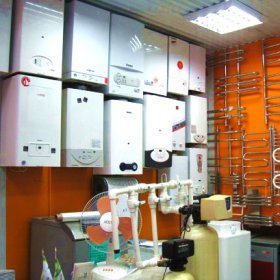
Each of us wants to live in a warm comfortable house. And this is completely uncomplicated if you live in a multi-storey building connected to a common heating system. However, the benefits of civilization in the form of centralized heating are far from accessible everywhere. What to do in this case? There can be many solutions to the problem. The industry produces a wide variety of heating boilers for a private house. They work on various types of fuel, differ in the degree of efficiency and economy. To choose among such a variety the optimal option is quite difficult. Let's try to figure out and determine for ourselves the advantages and disadvantages of each type of heating device.
Before you start reading, we suggest you watch the review video:
Content
Gas boilers: an overview of the pros and cons
The principle of operation of gas equipment can be described as follows. A constantly burning igniter ignites a gas burner when fuel enters. It warms up the coolant to the desired temperature, which is set in advance. Then the burner automatically shuts off. The temperature of the coolant is controlled by a temperature sensor. It initiates the resumption of gas flow after the temperature drops below the set point. As a result, the burner starts its work again, maintaining a constant coolant temperature.
The basic configuration of the device necessarily includes a gas valve, a burner, a heat exchanger, an automation system, a circulation pump, traction, pressure, temperature sensors and an expansion tank. The equipment operates in automatic mode. Gas-powered devices are characterized by the greatest technical complexity and the maximum number of modifications. Boilers have several classifications. By type of burner distinguish:
- Devices with an atmospheric burner. Differ in the presence of an open combustion chamber. The air needed to mix with the gas is taken directly from the room. The products of combustion are discharged naturally.
- Devices with a blast burner. Equipped with a closed combustion chamber with a built-in fan, which creates a forced draft. Combustion products are vented out. Air for the air / gas mixture is also taken from the outside.
By the method of placement of the device are divided into:
- Wall mounted. These are boilers of small weight and dimensions, respectively, and of small power. Most often they are supplied complete with strapping fragments, a circulation pump, an expansion tank, etc.
- Floor standing. High power devices.They are located directly on the floor or on a special platform. Go on sale without strapping elements.
Gas appliances can be produced with steel or cast-iron heat exchangers. The former are notable for considerable power and high efficiency, but shorter service life. Boilers with cast-iron heat exchangers last longer, but have less power.
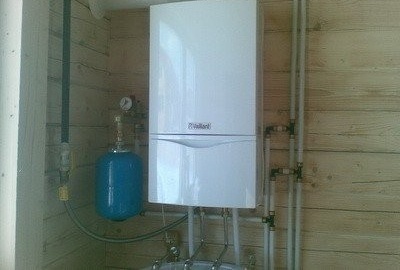
Wall-mounted models of gas equipment are compact, lightweight and fully equipped upon sale. However, their power is also small.
Gas is a cheap fuel, the combustion of which produces the maximum amount of heat compared to other types of fuel. And toxic emissions into the atmosphere are relatively small. Gas-powered equipment has many advantages:
- Profitability, which provides high efficiency of the device and cheap fuel.
- No need to build up fuel.
- Long service life. The device with a steel heat exchanger will last about 30 years, with a cast-iron one - about 50 years.
- Human control during operation is not required.
Among the disadvantages include:
- Gas connection and commissioning of equipment can be carried out only after the official approval of the necessary project documentation by special services.
- Possible pressure surges in the pipeline can damage the heater or cause the heating system to turn off.
More information about gas boilers can be found in the articles:
- How to choose a dual-circuit floor gas boiler: what to look at first?
- How to service gas boilers so that they last a long time?
- How to choose a gas boiler: the main 5 points to look at before buying
- Technology and norms for installing a gas boiler: wall and floor options
- How to calculate the power of a gas heating boiler - an example of calculation + formulas
Pros and Cons of Electrical Equipment
Under the general name "electric boilers for heating a private house", there are three types of equipment that differ in the principle of operation.
TEN devices
As the name implies, inside such devices are tubular heating elements. It is they who heat the coolant, as a rule, this is water. Warming up occurs in a flowing mode. Such boilers are quite compact, can fit on the wall. Most often they are fully automated and do not require constant monitoring. They can work on antifreeze or on water. The main disadvantage is the appearance of scale on the heating elements, which leads to their failure.
Electrode devices
There are no heating elements in this device. The heat carrier is heated by transmitting current through the electrode to water, which is heated under the influence of its own resistance. Liquid heating occurs due to the interaction of negatively and positively charged particles at the molecular level.
The indisputable advantage of electrode boilers are small size and affordable cost. Among the disadvantages include the need for thorough preparation of the coolant, the inability to use antifreeze, constant monitoring of fluid circulation, as well as the need for regular replacement of the electrode, which dissolves over time.
Induction Electric Boilers
The operation of such a device is based on the phenomenon of electromagnetic induction. The equipment resembles a transformer enclosed in a welded metal case. In a completely sealed section is an inductor that does not come into contact with the coolant. In the process, the core of the coil heats up and transfers heat to the fluid circulating around it. A big advantage of such systems is the presence of an inductor, which is not subject to damage during operation. It also makes it possible to maintain a high efficiency of the device.The disadvantage is the large size of the device.
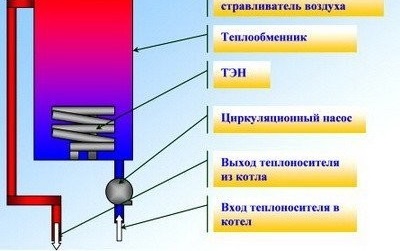
The electric heating element of the boiler includes tubular heating elements that heat the coolant. Most often it is water, but maybe antifreeze
In general, electrical equipment is extremely easy to operate and does not require special care. However, choosing one of these devices, one should take into account the features of the functioning of the local electric network. In case of too frequent blackouts, it is advisable to mount a backup generator, or put two boilers at once. One is electric, the other is using another fuel. The advantages of electrical systems include:
- The relatively low cost of the boiler.
- Simplicity in operation.
- Silent work.
- Ecological cleanliness.
- Small size, no need for special facilities and chimney installation.
Deficiencies of equipment are traditionally considered:
- High power consumption.
- Power surges quite quickly disable system automation.
- For boilers with a capacity of more than 6 kW, a three-phase 380 V network is required.
Read more about this type of boilers in the article: How to choose a good electric boiler: what to look at before buying?.
Solid fuel devices of various types
Installing a solid fuel boiler in a private house seems to be the most practical solution. The principle of operation of this device is extremely simple. Solid fuel is placed in the combustion chamber. It can be peat, wood, coal, fuel briquettes. Then follows the ignition, after which the fuel begins to burn, giving off heat to the coolant. After its burning, coals are formed, and a sufficiently rapid cooling of the liquid circulating in the pipes begins. There are several types of solid fuel devices.
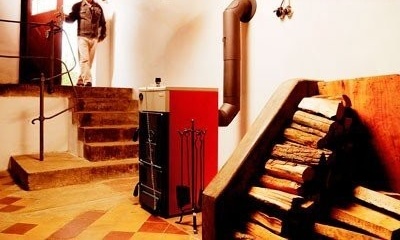
Solid fuel boilers of classical combustion have a simple design and are very easy to operate. However, they cannot remain without human control and are characterized by the lowest efficiency among similar devices.
Classical Combustion Devices
Such devices are characterized by the presence of a large combustion chamber, where the combustion of fuel occurs naturally. The design of the devices is extremely simple, which makes their operation simple, and the cost is quite low. The equipment is not demanding on the quality and type of fuel, non-volatile. The main disadvantage of such a system is a short burning time. Automating such boilers is quite difficult, so they require constant monitoring by humans. In addition, the efficiency of classical combustion apparatuses is the lowest of all solid fuel systems.
Long burning devices
This group includes two types of boilers. The first is pyrolysis devices. For their work, they use the process of pyrolysis or thermal decomposition of organics. Under the influence of high temperature, the fuel decomposes into the so-called pyrolysis gas and coke. The first enters the afterburner, mixes with oxygen, and burns. Such devices are characterized by high efficiency, low fuel consumption and the ability to automate the process of controlling the operation of the boiler.
The second type of devices - devices "smoldering" type. Here, combustion takes place like a candle - from top to bottom. A water jacket is integrated around the perimeter of the device. The sufficiently large dimensions of the combustion chamber and the slow smoldering of only the upper part of the fuel allow the combustion process to be extended for a sufficiently long time. Devices can be automated. The main drawback of the equipment is the same as that of pyrolysis devices - increased demand for fuel quality.
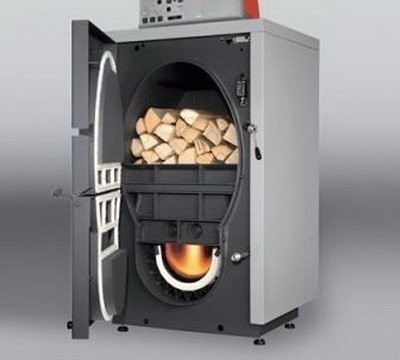
The pyrolysis boiler is equipped with two combustion chambers. The first is a pyrolysis process. The second of the first is a mixture of gases, here it mixes with oxygen and burns
Read more about solid fuel boilers in the articles:
Advantages and disadvantages of liquid fuel boilers
Devices running on liquid fuel are often used in small enterprises and in everyday life. In terms of efficiency, they can be put on a par with electrical devices, since the cost of diesel fuel, namely these systems most often work on it, is constantly growing. A significant advantage of the devices is the autonomy of the heating system, that is, the absence of dependence on the gas main. The boilers are energy-dependent because electricity is required to operate the pump, burner and combustion control device. However, it is possible to install an autonomous power supply.
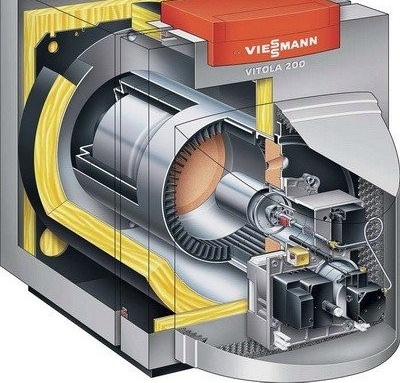
Boilers designed to run on liquid fuel are among the most expensive devices. Such a device and a burner cost significantly more than other types of heating equipment
The undoubted advantages of the devices include:
- High fuel efficiency. The efficiency of devices reaches about 94%.
- Emissions of toxic substances into the atmosphere are minimal.
- The design allows you to automate control over the device, which greatly facilitates its operation.
- Easy to maintain and maintain.
The disadvantages of liquid fuel devices are:
- High price. The boiler and burner for it are much more expensive than devices using other types of fuel.
- The appliance should only be installed in a separate room equipped with a cooker hood.
- To create a fuel reserve requires the installation of special containers made of steel or plastic.
- It is necessary to install a fine filter for fuel, otherwise the boiler will very quickly fail.
On our site there is an article about a home-made liquid fuel boiler: Do-it-yourself boiler for waste oil: an overview of design technology.
Advantages and disadvantages of combined boilers
This is a kind of universal device that allows the use of various types of fuel. Among the most popular systems include devices with two burners or one combined for working on liquid fuel and gas. Also popular are models with chambers for the combustion of solid fuels with the additional possibility of mounting mounted burners that can run on solid, liquid fuels and gas. And boilers with built-in heating elements and two separate combustion chambers, designed for four types of fuel at once.
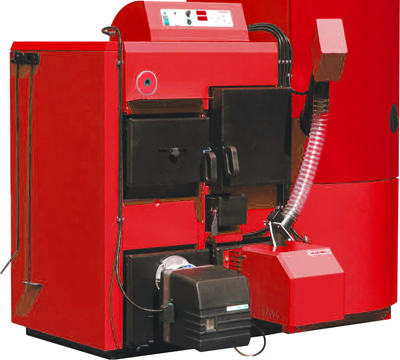
Combined boilers are universal. They can operate on different types of fuel. Because of this, their design is more complex, which increases the likelihood of breakdown
Combined devices are quite expensive and their use is justified only in case of constant interruptions with the supply of a certain type of fuel. The main advantage of the equipment is its versatility, which allows one device to operate on several types of fuel. The disadvantages include:
- Big sizes.
- A more complex design, respectively, increases the likelihood of breakage.
- High price.
It is quite difficult to answer unequivocally which boiler is better to choose for a house. To do this, you need to accurately understand all the features of the building, take into account its heat loss, layout, etc. You also need to evaluate your financial capabilities and make an estimate for the purchase of equipment and fuel that he will need. However, you can definitely say that you should not choose the cheapest option, it may well turn out that the cost of fuel, maintenance and possible repairs will be much more than the amount that can be saved.

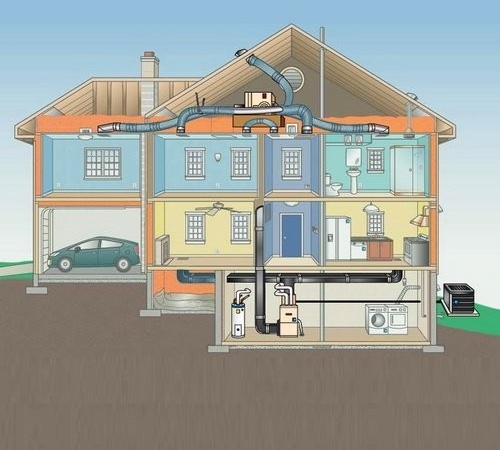
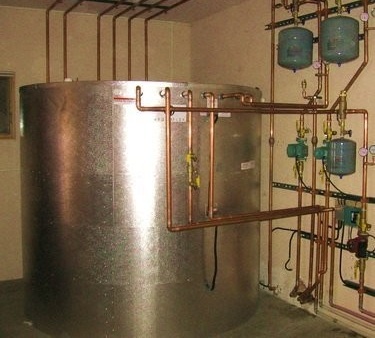
3 comments